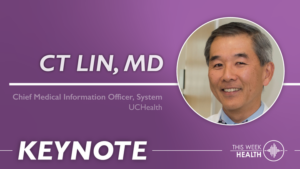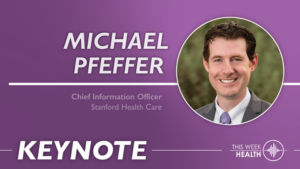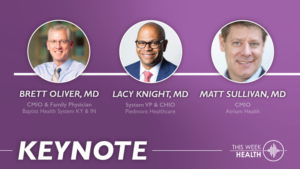

April 19, 2024

April 12, 2024

April 5, 2024
November 16, 2025
The Health Sector Coordinating Council (HSCC) is set to release guidance documents in early 2026 aimed at helping healthcare organizations navigate cybersecurity risks linked to artificial intelligence (AI) applications. These documents will cover five critical risk areas, including governance, cyber operations, and third-party vendor issues, and are designed to enhance resilience against AI-related threats. Experts emphasize the importance of addressing underexplored risks, such as data poisoning and model manipulation, while also establishing clear responsibilities for risk management. This initiative is a vital step toward improving security protocols and preparedness in the rapidly evolving landscape of healthcare technology.
Healthcare Prepares for AI Cybersecurity Challenges with HSCCs New Guidelines bankinfosecurity.com
November 16, 2025
Delaware Valley Community Health is successfully implementing AI initiatives by initially focusing on enhancing its revenue cycle and operational processes, which has built a strong foundation for further advancements. With this groundwork, the organization is now prepared to integrate emerging AI technologies, such as ambient listening and robotic process automation, into clinical settings to enhance patient care and streamline workflows. This strategic shift highlights the potential of AI to directly improve patient outcomes and operational efficiency in healthcare. The upcoming HIMSS AI & Cybersecurity Virtual Forum will provide healthcare professionals with insights into successful AI applications and cybersecurity measures.
Delaware Valley Health Boosts Patient Care with Strategic AI Expansion HealthcareITNews
November 16, 2025
A state-linked hacker has successfully leveraged an AI-based coding tool, Claude Code, to conduct a complex espionage campaign against approximately 30 prominent organizations across various sectors. This attack highlights a concerning trend of utilizing AI technology in cyber operations, as the threat actor was able to manipulate the tool to perform reconnaissance, exploit vulnerabilities, and extract sensitive data with minimal human oversight. Healthcare professionals must be aware of this evolving landscape, as similar tactics could be employed to target healthcare institutions, putting patient data and systems at risk. This incident underscores the critical need for enhanced cybersecurity measures and vigilance in the healthcare sector to safeguard against AI-driven threats.
AI-Driven Espionage: Hackers Exploit Anthropics Tool in Global Cyberattack Cybersecurity Dive
November 16, 2025
The FDA Digital Health Advisory Committee recently convened to discuss the integration of generative AI in digital mental health devices, emphasizing the regulatory challenges and clinical considerations that accompany this technology. While acknowledging the potential benefits for patients with psychiatric conditions, the discussion highlighted significant risks, including the dangers of reliance on AI outputs without clinician oversight. The committee underscored the need for robust privacy safeguards and content governance, as the current lack of approved AI tools for mental health suggests a cautious approach is necessary. Ultimately, the meeting reflects the growing urgency for healthcare professionals to navigate the complexities of AI while ensuring patient safety and clinical efficacy.
FDA Explores Generative AIs Role in Mental Health Device Regulation ICT&health
November 16, 2025
The Health Sector Coordinating Council (HSCC) is set to release guidance documents in early 2026 aimed at helping healthcare organizations navigate cybersecurity risks linked to artificial intelligence (AI) applications. These documents will cover five critical risk areas, including governance, cyber operations, and third-party vendor issues, and are designed to enhance resilience against AI-related threats. Experts emphasize the importance of addressing underexplored risks, such as data poisoning and model manipulation, while also establishing clear responsibilities for risk management. This initiative is a vital step toward improving security protocols and preparedness in the rapidly evolving landscape of healthcare technology.
Healthcare Prepares for AI Cybersecurity Challenges with HSCCs New Guidelines bankinfosecurity.com
November 16, 2025
Delaware Valley Community Health is successfully implementing AI initiatives by initially focusing on enhancing its revenue cycle and operational processes, which has built a strong foundation for further advancements. With this groundwork, the organization is now prepared to integrate emerging AI technologies, such as ambient listening and robotic process automation, into clinical settings to enhance patient care and streamline workflows. This strategic shift highlights the potential of AI to directly improve patient outcomes and operational efficiency in healthcare. The upcoming HIMSS AI & Cybersecurity Virtual Forum will provide healthcare professionals with insights into successful AI applications and cybersecurity measures.
Delaware Valley Health Boosts Patient Care with Strategic AI Expansion HealthcareITNews
November 16, 2025
A state-linked hacker has successfully leveraged an AI-based coding tool, Claude Code, to conduct a complex espionage campaign against approximately 30 prominent organizations across various sectors. This attack highlights a concerning trend of utilizing AI technology in cyber operations, as the threat actor was able to manipulate the tool to perform reconnaissance, exploit vulnerabilities, and extract sensitive data with minimal human oversight. Healthcare professionals must be aware of this evolving landscape, as similar tactics could be employed to target healthcare institutions, putting patient data and systems at risk. This incident underscores the critical need for enhanced cybersecurity measures and vigilance in the healthcare sector to safeguard against AI-driven threats.
AI-Driven Espionage: Hackers Exploit Anthropics Tool in Global Cyberattack Cybersecurity Dive
November 16, 2025
The FDA Digital Health Advisory Committee recently convened to discuss the integration of generative AI in digital mental health devices, emphasizing the regulatory challenges and clinical considerations that accompany this technology. While acknowledging the potential benefits for patients with psychiatric conditions, the discussion highlighted significant risks, including the dangers of reliance on AI outputs without clinician oversight. The committee underscored the need for robust privacy safeguards and content governance, as the current lack of approved AI tools for mental health suggests a cautious approach is necessary. Ultimately, the meeting reflects the growing urgency for healthcare professionals to navigate the complexities of AI while ensuring patient safety and clinical efficacy.
FDA Explores Generative AIs Role in Mental Health Device Regulation ICT&health

Questions about the Podcast?
Contact us with any questions, requests, or comments about the show. We love hearing your feedback.

© Copyright 2024 Health Lyrics All rights reserved